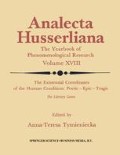Abstract
Human experience is flux, process, change. It is in the nature of human beings to try to understand this experience (is this not man’s eternal quest for meaning?), but how can we understand this experience, or even talk about it, if this experience is in continual flux? This problem is rendered even more complex with the realization that any attempt to understand human experience becomes, itself, part of the experience. We seem caught, then, much like Virginia Woolf’s record player needle, in a vicious circle that is endlessly retracing itself, a movement which underlines the hopelessness of our ever grasping its significance. Even if some way were found to stop this movement in order to explore it, that too would be futile since the experience would no longer be the same one (flux, process) that we had sought to understand, but some other.
Access this chapter
Tax calculation will be finalised at checkout
Purchases are for personal use only
Preview
Unable to display preview. Download preview PDF.
Notes
Arthur Koestler, ‘Cosmic Consciousness,’ Psychology Today (April 1977): 104.
Paul Ricoeur, La métaphore vive (Paris: Seuil, 1975). Translation mine.
Monroe Beardsley, ‘The Metaphorical Twist,’ Philosophy and Phenomenological Research 22, no. 3 (March 1962): 298; my italics point out the coined word “metaphoricalness,” and the formula “so to speak,” which always introduces a linguistic deviation.
Cited by Jacques Derrida, Marges de la philosophie (Paris: Editions de Minuit, 1972). Translation mine.
Gertrude Buck, ‘The Metaphor: A Study in the Psychology of Rhetoric,’ in Contributions to Rhetorical Theory, vol. 5, ed. Fred Newton Scott (Ann Arbor: Inland Press, 1899), p. 1.
Fred Newton Scott, ed., Contributions to Rhetorical Theory, pp. 2–3.
Max Black, Models and Metaphors: Studies in Language and Philosophy (Ithaca: Cornell University Press, 1962), p. 37.
Ricoeur, ‘The Metaphorical Process as Cognition, Imagination, and Feeling,’ On Metaphor (1979), p. 141. My use of metaphorical language is intended to underline the necessity and untranslatable quality of “non-literal” language.
David Miller, The Net of Hephaestus: A Study of Modern Criticism and Metaphysical Metaphor (The Hague: Mouton, 1971), p. 57.
Owen Thomas, Metaphor and Related Subjects (New York: Random House, 1969), p. 60.
Terence Hawkes, Metaphor (London: Methuen, 1972), p. 6.
Christine Brooke-Rose, A Grammar of Metaphor (London: Secker and Warburg, 1958), p. 93.
Hawkes, p. 19.
Brian Wicker, The Story-Shaped World, Fiction and Metaphysics: Some Variations on a Theme (Notre Dame: University of Notre Dame Press, 1975), p. 108.
Black, p. 37.
Ricoeur, La métaphore vive, p. 126.
Philip Wheelwright, Metaphor and Reality (Bloomington: Indiana University Press, 1962), p. 71.
Jean Cohen, Structure du langage poétique (Paris: Flammarion, 1966), p. 15. Translation mine.
Marcus Hester, The Meaning of Poetic Metaphor (The Hague: Mouton, 1967), p. 17.
Ricoeur, On Metaphor, p. 152.
Marshall McLuhan and Wilfred Watson, From Cliché to Archetype (New York: Viking Press, 1970), p. 142.
Ricoeur, On Metaphor, p. 152.
Martin Foss, Symbol and Metaphor in Human Experience (Princeton: Princeton University Press, 1949), p. 39.
Dylan Thomas, Quite Early One Morning (New York: New Directions, 1954), p. 193.
Richard Shiff, ‘Art and Life: A Metaphoric Relationship,’ On Metaphor (1979), p. 114.
Wicker, p. 11.
Author information
Authors and Affiliations
Editor information
Rights and permissions
Copyright information
© 1984 Springer Science+Business Media Dordrecht
About this chapter
Cite this chapter
Lawlor, P.M. (1984). Metaphor and the Flux of Human Experience. In: Tymieniecka, AT. (eds) The Existential Coordinates of the Human Condition: Poetic — Epic — Tragic. Analecta Husserliana, vol 18. Springer, Dordrecht. https://doi.org/10.1007/978-94-009-6315-3_18
Download citation
DOI: https://doi.org/10.1007/978-94-009-6315-3_18
Publisher Name: Springer, Dordrecht
Print ISBN: 978-94-011-7987-4
Online ISBN: 978-94-009-6315-3
eBook Packages: Springer Book Archive

